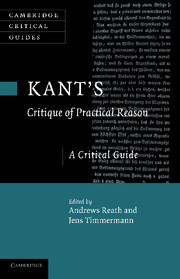Book contents
- Frontmatter
- Contents
- Preface
- List of contributors
- Translations and abbreviations
- Introduction
- 1 The origin and aim of Kant's Critique of Practical Reason
- 2 Formal principles and the form of a law
- 3 Moral consciousness and the ‘fact of reason’
- 4 Reversal or retreat? Kant's deductions of freedom and morality
- 5 The Triebfeder of pure practical reason
- 6 Two conceptions of compatibilism in the Critical Elucidation
- 7 The Antinomy of Practical Reason: reason, the unconditioned and the highest good
- 8 The primacy of practical reason and the idea of a practical postulate
- 9 The meaning of the Critique of Practical Reason for moral beings: the Doctrine of Method of Pure Practical Reason
- Bibliography
- Index
6 - Two conceptions of compatibilism in the Critical Elucidation
Published online by Cambridge University Press: 06 August 2010
- Frontmatter
- Contents
- Preface
- List of contributors
- Translations and abbreviations
- Introduction
- 1 The origin and aim of Kant's Critique of Practical Reason
- 2 Formal principles and the form of a law
- 3 Moral consciousness and the ‘fact of reason’
- 4 Reversal or retreat? Kant's deductions of freedom and morality
- 5 The Triebfeder of pure practical reason
- 6 Two conceptions of compatibilism in the Critical Elucidation
- 7 The Antinomy of Practical Reason: reason, the unconditioned and the highest good
- 8 The primacy of practical reason and the idea of a practical postulate
- 9 The meaning of the Critique of Practical Reason for moral beings: the Doctrine of Method of Pure Practical Reason
- Bibliography
- Index
Summary
The ‘Critical Elucidation of the Analytic of Pure Practical Reason’ develops two distinctive conceptions of how freedom of choice and causal determinism may be reconciled. These two conceptions of freedom of choice correspond to a distinction between what Kant calls ‘psychological’ and what he calls ‘transcendental freedom’. A person's choices are ‘psychologically free’ when those choices are determined by the psychological states of the agent rather than by external causes. Psychological freedom in this sense is compatible with causal determinism in the sense traditionally associated with the metaphysical doctrine of compatibilism. While such psychological freedom is involved in our choices, Kant argues that it is not strong enough to support the conception of choice required by the demands of moral responsibility.
Kant endeavours to show that theoretical attempts to explain how the kind of free agency presupposed by moral responsibility can be accommodated in psychological or broadly natural terms are illusory and must fail. His reasons, however, go deeper still. Kant thinks that no comprehensive explanation is forthcoming at all of how such free agency is possible. This leads him to a two-standpoint conception of human agency. When we regard our actions from the vantage point of moral responsibility, we regard them from a different standpoint from that which we occupy when we are explaining them in terms of antecedent causes. This may be regarded as a form of compatibilism, for it aims to show that free will and the thesis of causal determinism are mutually compatible.
Keywords
- Type
- Chapter
- Information
- Kant's 'Critique of Practical Reason'A Critical Guide, pp. 119 - 144Publisher: Cambridge University PressPrint publication year: 2010
- 1
- Cited by

